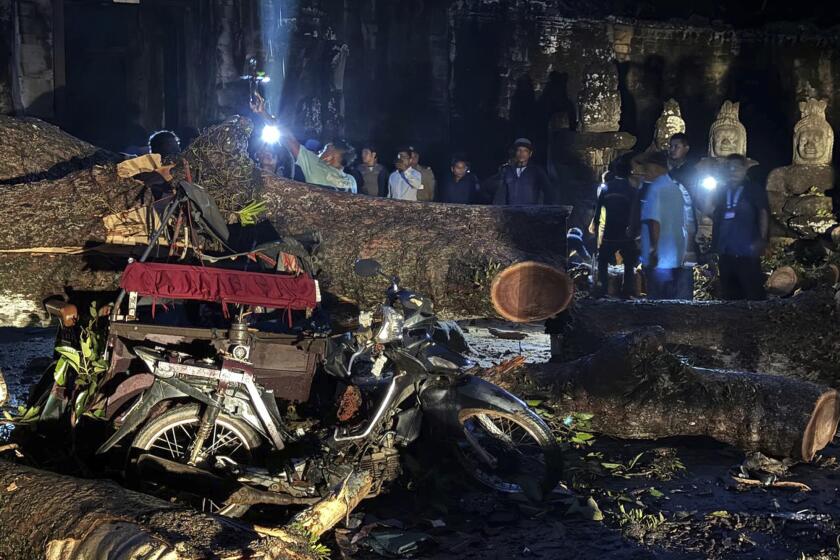America at the Crossroads : Life on the Spokane Reservation : RESERVATION BLUES, <i> By Sherman Alexie (Atlantic Monthly Press: $21; 306 pp.)</i>
The Spokane Native American reservation, as the novelist Sherman Alexie imagines it, surrounds Wellpinit Mountain in eastern Washington. “Pine trees blanketed the mountain and the rest of the reservation. The town of Wellpinit sat in a little clearing below the mountain. Cougars strolled through the middle of town; a bear once staggered out of hibernation too early, climbed onto the roof of the Catholic Church, and fell back asleep.” The Spokane reservation--”Population: Variable”--is almost empty of people but full of their forgetting, a place where life is ordered by “rules of conduct that aren’t collected into any book and have been forgotten by most of the tribe,” but the dietary staples are beer, commodity cheese, commodity applesauce and commodity peanut butter.
Big Mom, a legendary source of wisdom and the best fry bread cook on the reservation, lives at the top of Wellpinit Mountain. One day, a black man appears on her doorstep. He is Robert Johnson, the great blues guitarist, who wrote a famous song about going to the crossroads. That song provides one of the epigraphs to Sherman Alexie’s wonderful new novel, “Reservation Blues.” But “Reservation Blues” is not Big Mom’s story, nor is it Robert Johnson’s. It’s the story that results when Johnson gives his magic guitar--a guitar that talks and plays itself and finds its way home when lost--to a young Spokane Native American named Thomas Builds-the-Fire. Thomas is the reservation storyteller, a teller of tales that hang “in your hair or clothes like smoke.” Thomas also writes songs, plays bass and sings. With his friends--Victor Joseph, who inherits Johnson’s guitar; Junior Polatkin, the drummer, and Chess and Checkers Warm Water, two women from the Flathead reservation in Montana--Thomas assembles a rock-and-roll band called Coyote Springs. Coyote Springs comes to life, it practices, it plays, it acquires a reputation and it collapses under the weight of its own hopes. So much for the plot.
“Reservation Blues” is an extension, a fulfillment really, of Alexie’s remarkable 1993 short-story collection called “The Lone Ranger and Tonto Fistfight in Heaven.” In both books, the setting is the Spokane Reservation and the main characters are Thomas, Victor and Junior, though the boys in the short stories have grown into their 30s in the novel. The prevailing tone in these two books is one of excoriating humor, and they are written with a hard-luck wit that is somehow darker than the mute appeal of pure tragedy and at the same time more forgiving. Alexie writes fictions of consciousness, not event. Their subject is, nakedly, ethnically, what it means to be Native American. As you read “Reservation Blues,” you can feel Alexie’s purposely divided attention, his alertness to a divided audience, Native American and Anglo. He is willing to risk didacticism whenever he stops to explain the particulars of the Spokane and, more broadly, the Native American experience to his readers. But Alexie never sounds didactic. His timing is too good for that. “Reservation Blues” never misses a beat, never sounds a false note.
In the most obvious narrative sense, Thomas Build- the-Fire occupies the heart of the novel. “With his long, black hair pulled into braids, he looked like an old-time salmon fisherman: short, muscular legs for the low center of gravity, long torso and arms for leverage to throw the spear.” Thomas is the novel’s conscience, and it is Thomas’s puzzlement, his quizzical outlook on the world, that the reader comes to understand best. But the central character in “Reservation Blues” is really the reservation itself, the crossroads of which Robert Johnson sings. It is both a land of exile and an occupied territory, a place where the Spokane Native Americans--who, like all Native Americans, have lost control of the symbols that represent them--are constantly negotiating their identity in the face of white America, trying to decide how Native American is it whenever a question of value arises. Before he dropped out of college, for instance, “Junior had learned from Freud and Jung that dreams decided everything. He figured that Freud and Jung must have been reservation Indians because dreams decided everything for Indians, too.”
Because they still expect a kind of exoticism from Native Americans, some readers will find it hard to believe how American Alexie’s vision of the Spokane Reservation is. I don’t mean that in this novel the Spokane Reservation somehow represents America--a trivial idea, at best. I mean that in its eclecticism, in the way it adapts what it wants from the white world as well as what the white world forces upon it, the reservation reflects with peculiar intensity the cultural incoherence of the nation surrounding it. Where a cultural gap arises, something fills in, no matter how incongruous it seems. “All they know about religion they say in ‘Dances with Wolves,’ ” Thomas says of Junior and Victor. When he is obliged to defend the music of Coyote Springs, Thomas says, “An Indian woman invented the blues a day before Columbus landed, and the rock ‘n’ roll the next day.” In Alexie’s world, you take your origins wherever you find them.
Still, the collision between white and Native American cultures resonates throughout “Reservation Blues.” One of the prevailing dream-images in this novel is a 19th-Century massacre of Native American horses by the U.S. Army, a massacre that ended with the murder of one last emblematic colt. “That colt,” writes Alexie, in a way that suggests the layering of this novel, “fell to the grass of the clearing, to the sidewalk outside a reservation tavern, to the cold, hard coroner’s table in a Veteran’s Hospital.” Other times, Alexie wastes no time on ellipsis or metaphor or memory. Betty and Veronica are two white women, groupies of an all too familiar sort, who latch onto Victor and Junior. But at last reservation life is too much for them, and they leave for Seattle. “Can’t you handle it?” Chess Warm Water asks Betty and Veronica as they get ready to go. “You want the good stuff of being Indian without all the bad stuff, enit? Well, a concussion is just as traditional as a sweatlodge. . . . What did you New Agers expect? You think magic is so easy to explain? You come running to the reservations, to all these places you’ve decided are sacred. Jeez, don’t you know every place is sacred? You want your sacred land in warm places with pretty views. You want the sacred places to be near malls and 7-11s too.”
It’s almost impossible to talk about Alexie’s subject--ethnicity, cultural dominance, poverty, alcoholism--without turning serious, if only because seriousness is such a good mask for ineffectuality. Alexie himself is scathingly funny. His sense of humor ignores every cultural boundary, and its frankness is amiable and appealing. Here is an example. Near the end of the novel, after Coyote Springs has returned to the reservation, Junior Polatkin kills himself. One day, he turns up in the passenger seat of a van that Victor is driving.
“Victor was nervous. He’d never talked to the dead before. It felt like a first date.
‘This feels like a first date, enit?’ Junior asked.
‘Yeah, it does.’
‘So,’ Junior said, ‘am I going to get lucky?’ ”
Alexie has been called a lyrical writer, but to call him that is to miss how deadpan he really is, how much his humor depends on saying what hurts in a matter-of-fact voice. Humor never mitigates the truth, not even when it’s as painful as the truth Alexie’s characters constantly face. The reservation truth in “Reservation Blues” boils down to something Chess Warm Water discovers one night when she and her sister and Thomas are talking about their drunken fathers. “ ‘Ain’t that the true test?’ Chess asked. ‘You ain’t really Indian unless there was some point in your life that you didn’t want to be.’ ”
Sign up for The Wild
We’ll help you find the best places to hike, bike and run, as well as the perfect silent spots for meditation and yoga.
You may occasionally receive promotional content from the Los Angeles Times.



